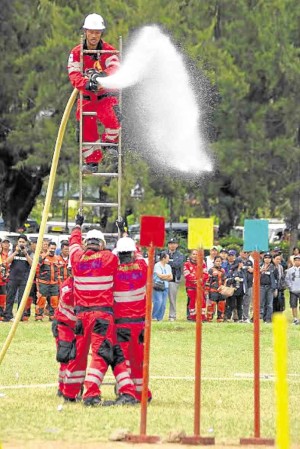Gov’t bonds eyed to fund closure of ‘zombie’ mines

Miners competed at the recent Mine Safety and Environment Week in Baguio City to show their skills in reducing risks at work, like putting out fire in their work sites. —EV ESPIRITU
BAGUIO CITY—How do we kill “zombie” mine sites? An economist said the Duterte administration could design a government bond dedicated to financing the closure of abandoned mines.
Over 800 mines have not been shut down properly or have been abandoned without proper rehabilitation, but “like zombies, they died but are still moving around trying to eat people,” said Patrick Caoile, economics professor of the De La Salle University and a former mining executive.
These are mines whose owners could no longer be found or are “financially unable or unwilling to rehabilitate their sites,” Caoile said.
These continue to exert a “malevolent effect on their afterlife,” and hound an industry that is facing criticism not only from antimine advocates but also from the Department of Environment and Natural Resources, Caoile said at the national mine safety and environment symposium held here last week.
He said closing down abandoned mines has become an immediate concern given the impact of climate change. But financing their closure has become a problem for the government, he said, since it was not clear who was responsible for these mine sites.
Article continues after this advertisementA “legacy bond,” however, could be suited for that purpose, Caoile said. A bond is a debt instrument which government sells to corporations, banks or investors to raise capital for a specific project.
Article continues after this advertisementCaoile said the government could consider patterning the legacy bond after the “Brady bond,” a debt-relief initiative led by the United States government to help bail out developing countries in the late 1980s.
“Basically the idea [for a legacy bond] is risk and reward,” Caoile said. Since there is enormous risk with abandoned mines, the reward should complement or match the risk, including the opportunity to reopen and rehabilitate these mines, he said. Reviving abandoned mines is allowed by law, he added.
Some of these mines are located in the Cordillera region, where these operated during the American colonial period.
Fay Apil, Cordillera regional director of the Mines and Geosciences Bureau, said the reopening and rehabilitation of these mines would require extensive studies “because we need to ensure that the tunnels are safe and there are no gases that would harm workers.”
The companies that operated the abandoned mines on Kennon Road here, for example, no longer exist, “and the government would need money to close the mines properly,” she said. —VINCENT CABREZA